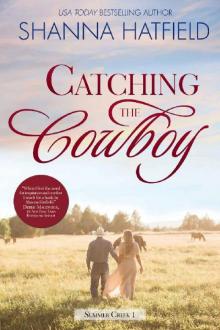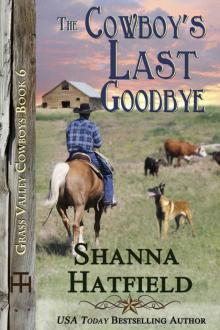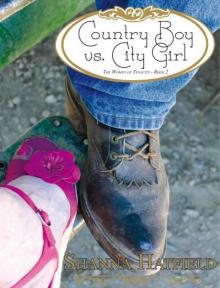- Home
- Shanna Hatfield
Home of Her Heart (Hearts of the War Book 2) Page 23
Home of Her Heart (Hearts of the War Book 2) Read online
Page 23
Try as he might, Klayne hadn’t been able to stand upright and he knew it had nothing to do with his broken leg or arm. The Chinese doctor assured him he’d be fine, but Klayne was starting to doubt the man’s cheerful assurance. Although the Chinese medical staff did their best, Klayne was relieved to see Doc. Maybe now, he’d find out what was really wrong and begin to heal.
While the pilot and crew shared their harrowing story of crashing in the water and barely escaping a Japanese patrol, Doc disappeared. A short while later, he returned after he’d bathed, shaved, and changed into clean clothes.
Unhurriedly, he examined each member of Klayne’s crew, even studying the bump on the gunner’s head and declaring him fine.
Doc spent the most time with the pilot, who was clearly in distress from his leg wound. When he came back around to Klayne, the man looked at his arm and leg again then shined a light in Klayne’s foggy eye. After he removed a bandage around Klayne’s head, applied medicine to the wound, and rebandaged it, he gave him a studying glance.
“Can you give it to me straight, Doc?” he asked, wanting to know the prognosis, but at the same time hesitant to hear the truth.
The doctor carefully sat on the edge of Klayne’s bed. “The breaks in your arm and leg were clean. They did a good job setting them, and you should heal fine. I’d prefer you have them in a cast, but this is better than nothing.” Doc touched the edge of the sling holding Klayne’s arm immobile. “I think the reason you can’t stand up straight is that you strained your back when you shot out of the plane into the water. Basically, you were like a cannonball fired out of the nose of the plane as it crashed. With time and plenty of rest, that problem should resolve itself, but you’ll have to be patient. I can’t promise you won’t have pain in it from time to time in the years to come, but I think it’s more likely you won’t notice issues.”
Klayne nodded then asked the question that had really been bothering him. “What about my eye, Doc. They’ll boot me out if I can’t do my job and being able to see is definitely a big part of it. That’s my sighting eye.”
Doc rested his elbows on his knees and gave Klayne a long look. “The cut down your face went right over your eye, Klayne. It damaged the cornea. Your vision may improve as the scratches heal. However, one of them is very deep and you’ll most likely always have blurry vision because of it.”
Klayne didn’t know which bit of news to digest first, the fact he had cuts on his face, or the fact he’d never see properly out of the eye again. His career with the military was effectively over. A bombardier who couldn’t sight was useless.
“What cuts on my face?” he finally asked, reaching up and, for the first time noticing a bandage wrapped around his head. He could feel scabs from his eyebrow all the way down to his jaw.
Doc pulled his hand away and shook his head. “You need to leave those alone and let them heal. It looks as though the doctor here gave them a good cleansing. I don’t see any signs of infection, which is a blessing, all things considered.”
“I haven’t looked at my face since the morning we left the ship.” Klayne started to reach up again, but dropped his hand to his lap. “Can I look in a mirror, Doc?”
The doctor stood and hesitated by the side of Klayne’s bed. “Let’s wait a few days, Klayne. There’s no rush.”
“Please, Doc? I need to see.” Klayne felt an almost desperate urgency to see what had happened to his face. It’s not that he was vain, but he knew he was good-looking, knew Delaney found him inordinately attractive. What if she couldn’t stand to look at him? What if he was grotesquely disfigured? “Please?”
The doctor motioned to a nearby nurse who produced a small mirror. Klayne couldn’t see his whole face in it, even holding it out away from him, but what he did see caused him to suck in a gulp. He had no idea what was behind the bandage wrapped around his forehead, but from his eyebrow all the way down to his jaw a series of jagged, angry scabs gave testament to his wounds. Some cuts were deep, others shallow, one even dipped across his eyelid. Bruises covered both eyes, and a chunk of his lip was missing from one corner. He looked like some sort of macabre madman.
How had he not even noticed the wounds to his face? He supposed the pain from his broken limbs and the strain on his back made him oblivious to the other injuries.
Mindful of the rising look of disgust on Klayne’s face, Doc took the mirror away and handed it back to a nurse. “It will all heal, Klayne. That little spot on your lip will fill in. You won’t even notice it soon. The scabs will give way to scars that will heal. Most of them aren’t deep and may not even leave a scar behind. Keep positive and focus on healing.”
Klayne nodded, although all he could think about at the moment was what Delaney would say when she saw him again. In the course of a few days, he felt like he’d aged thirty years. What if he could never stand up straight again. What if the scars on his face looked as bad as the scab-covered wounds? What if he went completely blind in that eye? What if…
“Just stop it,” he muttered to himself and took a calming breath. Until his wounds healed and he could return to Delaney a whole man, he wouldn’t return at all. And if that day never came, she could just think he’d died in the raid, one more casualty of the war.
The following day, the gunner from Klayne’s bunch and the other crew with the exception of the doctor, left the hospital, promising to let others know they had survived. They planned to make their way to a designated rendezvous area where they could get on a plane bound for home.
Klayne didn’t look in another mirror during the remainder of the time he spent at the small hospital. The injured men of his crew had been there nearly three weeks when word came that Japanese were approaching the area. Early the next morning, Klayne and the other men were loaded onto sedan chairs and carried out of the city. Doc fussed over the pilot who was still recovering from surgery on his leg.
A full month had passed since the Tokyo raid. As Klayne rode uncomfortably in the chair, he noticed the wild, beautiful land in which they traveled. Sometimes there were paths, other times nothing but tangled jungle, but onward they went. They traveled through villages where they were greeted warmly, given strange and foreign food, and offered small gifts. Finally, they reached a village that had an old bus. The men were loaded in it and they continued on their journey.
Despite their shouts of terror, the driver seemed only interested in honking his horn and careening around corners and winding paths as fast as the old bus could rumble. The airport they eventually reached had been blown up by the Japanese, as was the next airport they journeyed to. With each passing mile, hope of getting out of China alive diminished. The doctor did find a supply of iodine, though, and dabbed the wounded men from head to toe, covering every scratch, bite, sore, and cut with it.
Klayne was surprised the next morning when they went out to load onto the bus and discovered a newer model Ford station wagon waiting instead. After the car took them as far as a water crossing, they boarded a ferry and drifted down a stream, making their way to another airport that had also been destroyed. After two more days of travel, the men made it to a train station. They boarded the train and continued their travels. The men arrived at a hostel where word was relayed to military forces to send a plane for them. Several days passed, each one bringing a greater sense of desperation to escape China before the Japanese captured them or they died from their wounds.
Finally, a plane arrived for them. When it did, Klayne’s crew reunited with three other men from the raid who had flown in to rescue them.
The emotional reunion gave way to the men sharing what they knew about each crew, including the details that two of the sixteen crews had been taken prisoner by the Japanese. As far as the men knew, not a single plane had survived, all crashing in the ocean or in China.
Klayne’s heart sank at this news, imagining the horrors visited upon the men who had been captured, especially if the Japanese discovered they had been the raiders who dropped the bombs
on Tokyo and the surrounding cities.
On the fifth day of June, Klayne grew lightheaded as they flew over the hump of the Himalayas and landed in one of the new American bases in India.
He’d just limped his way to a room for the night and settled onto the bed when a noise in the hall drew his interest.
All of the sudden his door burst open and Bob strolled in, wearing a broad smile. “Klayne, old man, the lengths you’ll go to in order to get out of work are impressive!”
Klayne grinned and reached out a hand to his friend. Bob shook it, then gave him a bear hug. “What are you doing here, Bob? I figured you’d be back in the States.”
“No. I’ve been working around here, bombing the Japanese transports when they come over.” Bob took a step back and studied Klayne. “It’s a good thing you’re married. Girls are going to go wild for those rugged scars on your face. Makes you seem even more dangerous and untamed.”
Klayne snorted in disbelief. “I look like some sort of crazed ghoul, but I don’t want to talk about that. Have you heard from Norene and the girls?”
Bob nodded and patted his pocket. “Just got a letter today. They’re doing great. Norene decided to stay with her mother for now, since I have no idea when I’ll be back. The girls enjoy being around their grandma, so it’s a good situation for everyone.” Bob gave him a knowing look. “What about you? Have you written to Delaney and let her know you’re okay?”
“No. I don’t want her to know anything until I’m well. She’s better off without me, particularly like this,” Klayne said with disgust. “I’d be a burden to her, not a help. And the last thing she needs is one more thing to take care of on the ranch. I figure by now, she’s probably lost most of her help to either the draft or enlistment.”
“All the more reason for you to write to her. The poor girl is probably sick with worry, Klayne. It’s only right to let her know you made it through and are heading home.”
Mindful that Bob would only argue with him, Klayne changed the subject. The two men talked for several hours until Klayne could no longer keep his eyes open.
“Rest well, old man. I’ll stop by to see you in the morning.” Bob smiled as he walked out of Klayne’s room.
The next morning, Bob ate breakfast with him then had to hurry to leave for his next mission. Before he left, he handed Klayne a letter. “If something happens to me, make sure Norene gets that. I have to assume the last one I wrote is probably at the bottom of the China Sea.”
“Yep, but you know you’re going to make it home to your girls so I won’t have to deliver this,” Klayne said, tucking the letter into his meager belongings. He’d collected a few things since the crash, gifts from villagers, including a tea set from a couple who somehow finagled out of him the truth about his married state. They insisted he take the tea set as a gift to his wife.
“Take care of yourself, Klayne, and tell Delaney not to let you off easy when you do make it home. When this war is over, I want all of us to get together. Maybe take a trip to the Oregon coast.”
“I’d like that, Bob. You know where to find me. Be safe, my friend.” Klayne gave Bob a warm handshake then patted his arm, hoping the man knew how much he valued his friendship.
Bob nodded, offering an unspoken confirmation that he understood then walked out the door.
Klayne’s thoughts dwelled on Delaney after Bob departed. He hadn’t been much of a husband to her in the months they’d been married. Bob was right. He had a lot of making up to do, when and if he ever made it home to her.
He continued to think about making amends as he flew from India to Baghdad, on to Cairo, Nigeria, Trinidad, and then Puerto Rico before landing in Washington D.C.
The injured men were taken directly to a military hospital. Klayne’s arm and leg were properly reset and cast. The bandage on his head was removed and the wound treated, but he tamped down his urge to look in a mirror.
The colonel, now a general, who led their raid appeared and shook their hands, thanking them for a job well done and for their sacrifices.
For reasons Klayne couldn’t explain, he felt antsy to be closer to Pendleton. Now that he was back on American soil, he wanted to go home. Even if he wasn’t ready to face Delaney, he wanted to be nearer to her than clear across the country.
To his knowledge, no one, with the exception of Bob and the officer who’d filed his paperwork including her as a beneficiary, knew he’d married. He planned to keep it that way.
Near the end of June, the general decorated twenty-five of the soldiers who’d gone on the raid in a ceremony, awarded each one of them a Distinguished Flying Cross “in recognition of heroism and extraordinary achievement while participating in the Raid on Tokyo.”
A week and a half later, the general came to the hospital and presented awards to those there. In spite of the fact some of the men were in casts and wearing pajamas, he proudly pinned on their medals. The Chinese government also sent awards to them through the military attaché at the Chinese Embassy in Washington.
Klayne didn’t feel deserving of any awards or honor. He’d merely been doing his job. On top of that, they’d crashed their plane and their presence in China on their flight to escape had resulted in Japanese retaliation in nearly every village they’d visited.
The deaths of all those innocent people hung heavily on Klayne’s heart.
Not long after that, Klayne and the rest of the men received promotions. He was pleased to move into the rank of Master Sergeant. He spoke at length with the general about his inability to continue working as a bombardier due to the problem with his vision which, as of yet, showed no signs of improvement.
“General, I know I’ve asked before, but do you think I could transfer to a hospital closer to home? Please?” Klayne pleaded with the general one afternoon when he stopped by to see how they all were recuperating.
“What’s at home you’re so eager to get back to, Sergeant?” the general asked, giving him an interested look.
“Well, it’s just that…” Klayne looked around to make sure no one was listening. “I left a wife in Pendleton and I’d sure like to be closer to her.”
“I see. How long have you been married?”
Klayne forced himself to hold the general’s penetrating gaze. “We married in early February, sir.”
The general couldn’t hide his surprised look, but quickly replaced it with a passive expression. “I see,” he repeated, then left.
The next morning, Klayne had just eaten breakfast when he received word he was being transferred that afternoon to a veteran’s hospital in Portland.
With a shout of glee, he packed his few belongings and eagerly made the long, painful journey across the country.
He settled into the hospital with minimal difficulty, fueled by the thought he was at least in the same state as Delaney.
One feisty little nurse, who looked more like a pinup girl than someone trained in a medical profession, pushed him to the limits of his physical endurance. He heard other men griping about Nurse Billie being a hard taskmaster, but she got results.
Results were what he needed to make it back to his wife.
Chapter Twenty
Delaney wiped the sweat from her brow with the arm of her cotton shirt and settled the old dirt-encrusted hat back on her head. She looked ahead as the self-propelled combine she drove cut the golden sheaves of wheat, sucked it in, and separated the kernels of grain from the chaff.
Her back ached so badly, she could hardly stand it, but she ignored the pain and focused on the job at hand. By now, there was no hiding her pregnancy. She’d explained to all the young people in her employ that her husband had gone on a raid over Japan and disappeared. After the girls hugged her and dabbed at tears of sympathy, the boys had called Klayne a hero. They all wanted to see the photos and news clippings she had of him.
In spite of her heart and head telling her she was being ridiculous, she couldn’t help but feel a hot, boiling anger every time she thought of him.
There were days she wished she’d never gone to that New Year’s Eve party, never met Klayne. Other days, her heart swelled with gratitude that she’d married him, loved him, for even such a short time. Because if nothing else came out of their very brief union, she would cherish the baby he’d given her.
The baby was the only bright spot Delaney could find some days. The previous week, the ranch had suffered another blow when they received word Yank, one of their favorite cowboys, had gone missing and was assumed dead during the Battle of Guadalcanal.
The men and Delaney mourned the news about Yank and prayed for the safety of their former ranch hands.
Uncertain how much more death, injury, or devastation she could take, Delaney tried to bury herself in work. Butch and Duffy had both thrown fits when she informed them she planned to drive one of the combines during their wheat harvest.
“You can’t drive any equipment in your condition, Girly!” Butch had shouted.
Delaney had scowled at him and pulled on her gloves. “I can and I will and there isn’t a single person on this ranch who is going to stop me!”
Although Duffy and Butch continued to argue against her active participation in the wheat harvest, Delaney couldn’t see how riding on a tractor seat would cause any harm to the baby. Just to help the men rest easier, she even asked Doctor Nash for permission and grudgingly received it.
As she finished a row of wheat and turned the combine to make another swath through the field, she glanced overhead. The September sunshine was as hot as if it was mid-July, beating down with relentless vigor. She would have wished for a breeze or clouds, but the sunny day was perfect for bringing in the wheat. If the weather held, they only had two more days before they’d be finished cutting almost four thousand acres of wheat.
Delaney was glad she’d talked her dad into buying three self-propelled combines the previous year. The machines made it possible for one person to cut a little more than fifty acres in a day. With three of them going, along with their old harvesters, they averaged almost five hundred acres of wheat a day.

 Heart of Clay
Heart of Clay Boughs of Holly
Boughs of Holly Wings of an Angel
Wings of an Angel Gift of Faith
Gift of Faith Tidings of Joy
Tidings of Joy Between Christmas and Romance
Between Christmas and Romance Capturing the Cavedweller's Heart
Capturing the Cavedweller's Heart Racing Christmas
Racing Christmas Gift of Grace
Gift of Grace Catching the Cowboy: A Small-Town Clean Romance (Summer Creek Book 1)
Catching the Cowboy: A Small-Town Clean Romance (Summer Creek Book 1) Heart of Hope
Heart of Hope Gift of Hope
Gift of Hope The Christmas Cowboy: (Sweet Western Holiday Romance) (Rodeo Romance Book 1)
The Christmas Cowboy: (Sweet Western Holiday Romance) (Rodeo Romance Book 1) Thimbles and Thistles: (Sweet Historical Western Romance) (Baker City Brides Book 2)
Thimbles and Thistles: (Sweet Historical Western Romance) (Baker City Brides Book 2) The Cowboy's Autumn Fall (Grass Valley Cowboys Book 4)
The Cowboy's Autumn Fall (Grass Valley Cowboys Book 4) The Christmas Quandary: Sweet Historical Holiday Romance (Hardman Holidays Book 5)
The Christmas Quandary: Sweet Historical Holiday Romance (Hardman Holidays Book 5) Crumpets & Cowpies: (Sweet Historical Western Romance) (Baker City Brides Book 1)
Crumpets & Cowpies: (Sweet Historical Western Romance) (Baker City Brides Book 1) Not His Type
Not His Type Heart of Love
Heart of Love The Christmas Crusade
The Christmas Crusade Marnie:
Marnie: Capturing Christmas
Capturing Christmas Bertie (Pendleton Petticoats Book 6)
Bertie (Pendleton Petticoats Book 6) Millie (Pendleton Petticoats Book 7)
Millie (Pendleton Petticoats Book 7) The Christmas Confection
The Christmas Confection The Christmas Token
The Christmas Token Barreling Through Christmas: (Sweet Western Holiday Romance) (Rodeo Romance Book 4)
Barreling Through Christmas: (Sweet Western Holiday Romance) (Rodeo Romance Book 4) Dream of Her Heart
Dream of Her Heart Thimbles And Thistles (Baker City Brides Book 2)
Thimbles And Thistles (Baker City Brides Book 2) Untangling Christmas (Silverton Sweethearts Book 3)
Untangling Christmas (Silverton Sweethearts Book 3) The Women of Tenacity
The Women of Tenacity Dacey: Bride of North Carolina (Amercan Mail-Order Bride 12)
Dacey: Bride of North Carolina (Amercan Mail-Order Bride 12) The Christmas Bargain
The Christmas Bargain Ilsa (Pendleton Petticoats Book 3)
Ilsa (Pendleton Petticoats Book 3) Caterina: A Sweet Western Historical Romance Pendleton Petyticoats Book 2
Caterina: A Sweet Western Historical Romance Pendleton Petyticoats Book 2 Rose (Beach Brides Book 9)
Rose (Beach Brides Book 9) Chasing Christmas: (Sweet Holiday Western Romance) (Rodeo Romance Book 5)
Chasing Christmas: (Sweet Holiday Western Romance) (Rodeo Romance Book 5) Garden of Her Heart (Hearts of the War Book 1)
Garden of Her Heart (Hearts of the War Book 1) Ilsa:
Ilsa: The Coffee Girl
The Coffee Girl The Christmas Confection (Hardman Holidays Book 6)
The Christmas Confection (Hardman Holidays Book 6) The Cowboy's Spring Romance
The Cowboy's Spring Romance The Cowboy's Last Goodbye (Grass Valley Cowboys Book 6)
The Cowboy's Last Goodbye (Grass Valley Cowboys Book 6) Country Boy vs. City Girl
Country Boy vs. City Girl Sleigh Bells Ring in Romance
Sleigh Bells Ring in Romance The Christmas Vow
The Christmas Vow Marnie (Pendleton Petticoats Book 4)
Marnie (Pendleton Petticoats Book 4) Dacey_Bride of North Carolina
Dacey_Bride of North Carolina Caterina (Pendleton Petticoats Book 2)
Caterina (Pendleton Petticoats Book 2) Home of Her Heart (Hearts of the War Book 2)
Home of Her Heart (Hearts of the War Book 2) The Dove: The Second Day (The 12 Days 0f Christmas Mail-Order Brides Book 2)
The Dove: The Second Day (The 12 Days 0f Christmas Mail-Order Brides Book 2) The Christmas Crusade (Silverton Sweethearts Book 2)
The Christmas Crusade (Silverton Sweethearts Book 2) Corsets and Cuffs: (Sweet Historical Western Romance) (Baker City Brides Book 3)
Corsets and Cuffs: (Sweet Historical Western Romance) (Baker City Brides Book 3) Lacy: (Sweet Historical Western Romance) (Pendleton Petticoats Book 5)
Lacy: (Sweet Historical Western Romance) (Pendleton Petticoats Book 5) Lightning and Lawmen
Lightning and Lawmen The Christmas Calamity
The Christmas Calamity The Cowboy's Autumn Fall
The Cowboy's Autumn Fall Chasing Christmas
Chasing Christmas Taste of Tara
Taste of Tara Learnin' The Ropes
Learnin' The Ropes Tad's Treasure (Grandma's Wedding Quilts Book 12)
Tad's Treasure (Grandma's Wedding Quilts Book 12) Love at the 20-Yard Line
Love at the 20-Yard Line The Dove_The Second Day
The Dove_The Second Day The Cowboy's Christmas Plan
The Cowboy's Christmas Plan QR Code Killer
QR Code Killer Lightning and Lawmen (Baker City Brides Book 5)
Lightning and Lawmen (Baker City Brides Book 5)